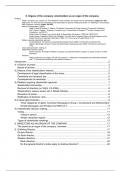Lecture notes
UCL 2022-23 Lecture notes: Organs of the company
- Module
- Company Law
- Institution
- University College London (UCL)
UCL 2022-23 Lecture notes: Organs of the company, covering: the nature of shareholders' interests, matters requiring shareholder approval, shareholder decision making, class rights protection (though little), and the role of directors
[Show more]




